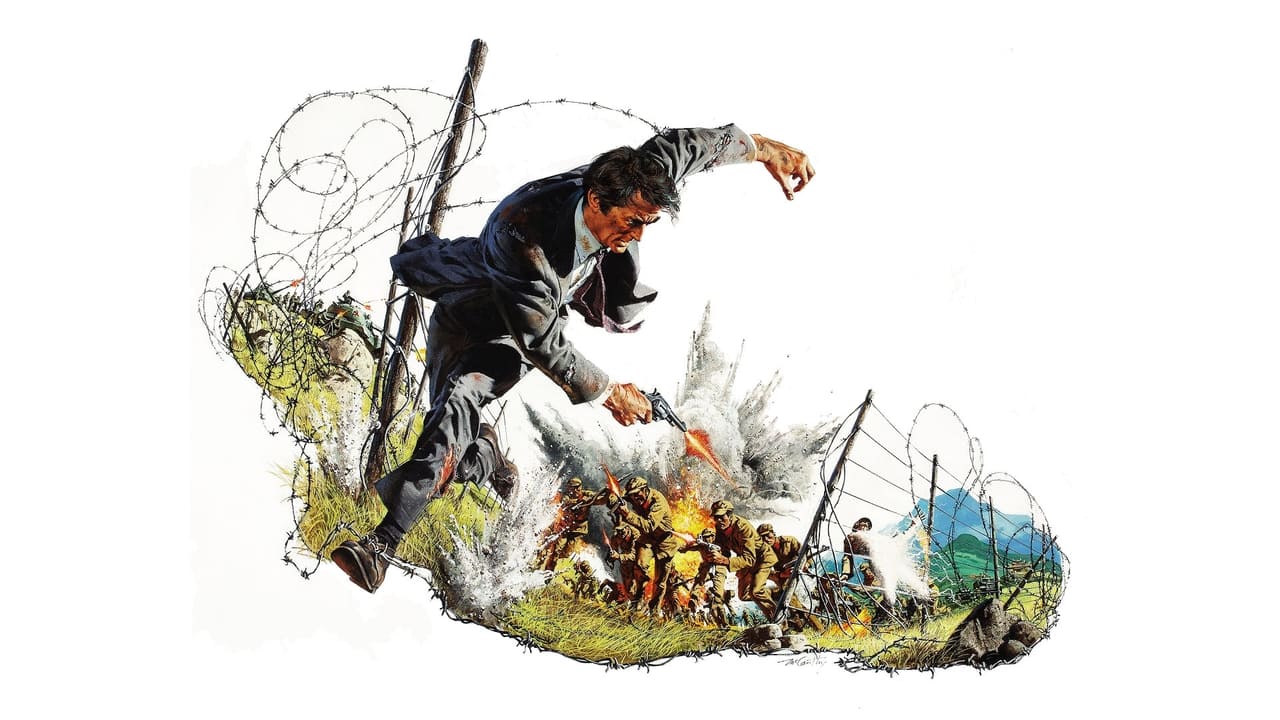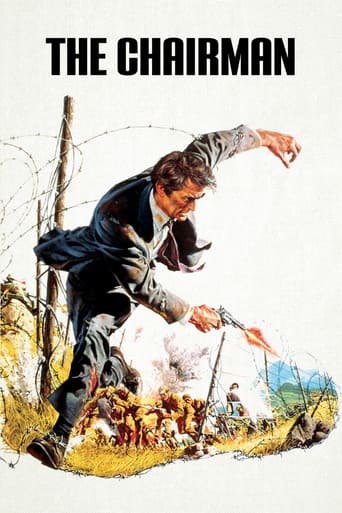

This movie is the proof that the world is becoming a sick and dumb place
... View MoreGood start, but then it gets ruined
... View MoreAfter playing with our expectations, this turns out to be a very different sort of film.
... View MoreThe film's masterful storytelling did its job. The message was clear. No need to overdo.
... View MoreAn American scientific named Hathaway (Gregory Peck, after his acting in Stalking moon), Nobel prize winner , is enlisted by British Intelligence Service and assigned Mao's Red China to retrieve a formula about a revolutionary agricultural enzyme that eliminates starvation , diseases and multiply mass production . His chiefs (Arthur Hill , Alan Dobie) have implanted a microchip in his head for placing him in the solitary mission whose unique contact results to be Chang (Burt Kwouk , usual in Peter Sellers' Pink Panther). But he doesn't know that it can be exploded if the mission fails . Hathaway leaves his girlfriend Kay (Anne Heywood) and aboard airplane to Hong Kong . Later on , he's transported to north of China , nearly Russia , where he finds professor Soon Li (Keye Luke, the clever master in Kung-Fu series). There Hathaway interviews President Mao (Conrad Yama) .This is a political/fiction/thriller , plenty of intrigue , suspense and action-packed in its final part . The film is an espionage story originally written by Ben Maddow with historic communist remarks during Mao Tse Tung period , as the'Great leap' and 'Red book of Mao'. In fact , there had propaganda campaigns mounted by Hong Kong communists claiming the film was anti Mao and anti Chinese consequently filming was transferred to Taiwán . Stars Gregory Peck who gives nice acting , though originally intended to be as a starring vehicle for Frank Sinatra . It packs colorful and evocative cinematography , shot in Pinewood studios of London , by John Wilcox and uncredited Ted Moore . Atmospheric production design , it was used the lab set left over from Fox's Fantastic voyage (1966). Moving and suspenseful musical score by the great master Jerry Goldsmith .The film is lavishly produced by Mort Abrahams and Arthur P. Jacobs who previously produced 'Planet of apes' . The motion picture was middlingly directed by J.L. Thomson (1914-2002) , during his splendor and successful time in the 60s , when he directed hits as 'Mackenna's gold' , 'Cape fear' , 'Taras Bulba' and 'Guns of Navarone' ; though in his last period he only directed Charles Bronson vehicles , such as : 'Death wish 4' , 'Kinjite' , 'St Ives' , 'Messenger of Death' , among others . The movie will appeal to Gregory Peck devotees.
... View MoreThe Chairman (GB title: The Most Dangerous Man In The World) is a typically twisty 60s spy thriller. It feels like a low-key James Bond adventure with a hint of The Man From UNCLE stirred in. Gregory Peck is the hero in this one, but in spite of his star charisma and the fact that the film has a fairly intriguing plot, it still emerges an overall disappointment. Something in the handling just doesn't quite add up maybe it's the way the film twists itself into semi-confusion, maybe it's the clumsy post-production editing which sticks out like a sore thumb, or maybe it's the fact that the sillier aspects of the storyline never quite convince as fully as they're meant to. Whatever the reason, The Chairman falls short of its potential.Dr. John Hathaway (Gregory Peck) is recruited by the CIA for a tricky undercover assignment in Red China. It seems the Chinese have almost perfected an agricultural enzyme that could allow crops to grow in hostile environments like mountains and deserts. Such an enzyme would allow China to gain absolute control of the world's mass food production market. Hathaway is a close friend of the man who invented the enzyme, revered Chinese professor Soong Li (Keye Luke). He is also considered by the Chinese as the one man who can help them to add the finishing touches to the formula. This is great news for the CIA, who need someone they can send into China to get close to those involved in the production of the enzyme without arousing suspicion. Hathaway agrees to do the job for them, and a microchip transmitter is implanted into his head which is capable of visually and aurally relaying everything he witnesses during his time in China. What Marshal Shelby (Arthur Hill) of the CIA doesn't tell Hathaway is that the transmitter in his brain is also wired up to a small explosive device, so that if the mission looks destined to fail or if it looks like he might fall into enemy hands his head can be blown off at any time simply by pushing a button! The best thing about the film is Jerry Goldsmith's rousing music score, which adds excitement to scenes that actually, on most occasions, aren't very exciting. In spite of the fact that Peck is in continuous danger virtually every moment that he's in China, the film somehow slackens the suspense when it should be tightening it. Long periods of the film are tedious and uninvolving. Peck gives a passable performance as the unsuspecting "walking bomb", even though he's not really the right actor for the role, while Arthur Hill's eye-patched official overseeing the operation might have stepped right out of a book of spy movie clichés. In the finale, Hathaway flees for the border with the Chinese army in hot pursuit, while Shelby's finger hovers perilously over the all-important bomb button. It's a reasonably taut climax, but comes too late in the day to save the film as a whole. In summary, The Chairman has a few highlights but generally speaking it's one of those films that could have, and should have, been better!
... View MoreThis movie is a relic of its day, reflecting the cold war paranoia that was already rather quaint by 1969. This sort of undercuts the film as anything to be taken seriously, but fortunately it's reasonably well-acted and directed so it still holds up as mildly entertaining -- if there's nothing better on TV to watch. Of historic note is that this film was produced by the same guys who made the much more memorable "Planet of the Apes" a year earlier (both films were scored by the great Jerry Goldsmith), and one of the sets is left over from "Fantastic Voyage."
... View MoreKeep in mind "The Chairman" was released (1969) while America was in the middle of the Vietnam War. Every government type in the movie hates Communism (so much that the assassination of Chairman Mao is considered) but Peck's character reserves judgment. Peck also has his doubts about, and questions, the Chinese system. In this manner he plays an "anti-establishment" role against both systems, the East and the West. The excitement of this movie is bolstered in no small way by the superlative musical score of Jerry Goldsmith. Goldsmith listened to oriental music samples before composing this score, and it is one of Goldsmith's finest (even better than his score for the original Star Trek movie). This film introduced me to the concept of the "Little Red Book", Mao's collection of sayings distributed to every school child. The movie was made when the Chinese were being recognized as the best ping pong players in the world, so Peck even gets a chance to play table tennis with Mao himself. Every great film has its unforgettable moments, and this has a good share of them too. I haven't seen this movie in maybe a decade but I still remember several scenes vividly: In China, the public beating of Peck's scientist colleague. Peck's attempt to get into the armored projection chamber which holds the secret to unlimited food production for the world's starving masses. His border crossing while being chased by the Chinese Army. And Peck's reaction when he observes the detonation of the bomb he didn't know he was carrying (once surgically implanted in his skull). If you like Gregory Peck, you will love this action treat.
... View More